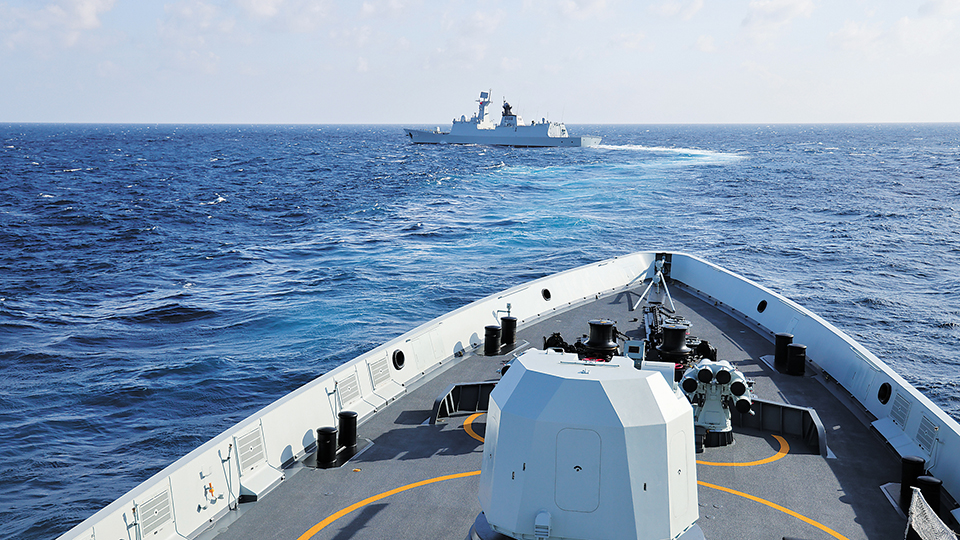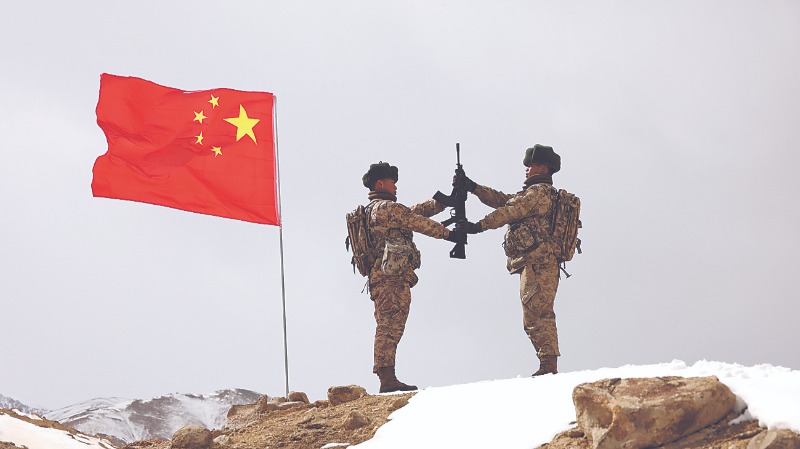By Ye Qiang
2月以来,美海军已先后派遣“麦凯恩”号和“罗素”号导弹驱逐舰,两次在南海开展所谓“航行自由”行动。另外本月9日,“罗斯福”号和“尼米兹”号两个航母打击群还在南海开展联合演练,这也是自2020年7月以来美军再次进入南海演习。
Since February 2021, the US Navy has dispatched the destroyer John S. McCain and the guided-missile destroyer USS Russell to conduct so-called “freedom of navigation operations”(FONOPs) in the South China Sea twice in succession. In addition, the USS Theodore Roosevelt Carrier Strike Group and the USS Nimitz Carrier Strike Group, also carried out joint drills in the disputed waters of the South China Sea on February 9, marking the second time the US military had operated in this area since July 2020.
至少从这些行动看,美政府换届还没对南海博弈带来根本性改变。学界普遍认为,拜登政府在南海问题上对中国极限施压的重心,将从军事和外交打压转向规则和法理的遏制。
It can be deduced from these actions at least that the Biden administration newly taking office has not brought a fundamental change to the game in the South China Sea. There is a general belief in the academic circle that the focus of the Biden administration’s “maximum pressure” policy on China over the South China Sea will shift from suppression by military and diplomacy to containment by rules and legal principles.
在此政策驱动下,美国将打着“基于规则的秩序”这一旗号,在法理方面给予南海其他声索方更多支持,推动与盟友和伙伴开展联合行动;利用和制造更多国际法问题、包括所谓“南海仲裁案”裁决结果挑战中国南海权益的法理基础,并对“南海行为准则”磋商施加影响;美军在南海及周边的军事活动和存在也将延续增强态势,继续通过规律性“航行自由”行动对国际法的解释和适用进行干预。
Driven by this policy, the US, under the banner of “rules-based international order”, is sure to offer more legal support to the other claimants to the South China Sea except China, to promote joint operations with its allies and partners. It will use and create more international law issues, including the so-called “South China Sea Arbitration”, to challenge the legal basis of China’s rights and interests in the South China Sea and exert influence on the negotiation of the “Code of Conduct in the South China Sea” (COC). In addition, the US military is bound to strengthen its activities and expand its presence in the South China Sea and surrounding areas as usual and continue to regularly take the so-called FONOPs to interfere with the interpretation and application of international law.
这一政策在美军方声明中可见一斑:美方把自己粉饰成国际法“维护者”,不仅污蔑中国对南海航行和飞越自由“构成威胁”。美声明还违反一个中国原则,故意将台湾与越南并列视为主权国家。显而易见,美方一面要求别国遵守国际法,另一面却习惯性地把自己视作国际法约束的例外者,在海洋法方面更是长期如此。
This policy can be evidenced by the US military statement,in which the US has assigned itself the role of the “defender” of international law, and slandered China as a “threat” to the freedoms of navigation in and overflight over the South China Sea. Besides, the US statement has also violated the one-China principle by deliberately placing Taiwan region and Vietnam side by side as sovereign states.
Obviously, on the one hand, the US requires other countries to abide by international law. Still, on the other hand, it habitually regards itself as an exception to the constraints of international law, especially in the law of the sea.
一个众所周知的事实是,美国是当前国际社会中极少数尚未加入《联合国海洋法公约》的国家,但却动辄挥舞《公约》“大棒”对他国海洋政策与地区海洋事务指手画脚。美方所谓“航行自由”,与《公约》中的公海航行自由没有任何关系。
It is a well-known fact that the US is one of the very few countries in the current international community that has not yet joined the “United Nations Convention on the Law of the Sea”(UNCLOS). However, it frequently wields the big stick of the convention to criticize other countries’ maritime policies and regional maritime affairs. The so-called FONOP proposed by the US has nothing to do with the freedom of navigation on the high seas as depicted in the convention.
美国假借公海航行自由横行他国管辖海域,意图在于影响或颠覆国际社会业已达成的对《公约》相关条款解释的共识。1979年,卡特政府开始推行“航行自由计划”,以表明不接受这些国家的海洋权利主张。根据美国国防部自1991年至2018年发布的报告,28年间美国根据“航行自由计划”执行的“航行自由”行动挑战了61个国家和地区的654项所谓“过度”海洋权利主张。
Under the guise of freedom of navigation on the high seas (that is, on the high seas, vessels of all flags enjoy unrestricted freedom of navigation as one of the freedoms of the high seas), the US has run wild across the waters under the jurisdiction of other countries, aiming to influence or subvert the consensus reached by the international community on the interpretation of relevant provisions in the UNCLOS.
In 1979, the Carter administration initiated the Freedom of Navigation Program to show that the US would not accept the maritime claims of the countries involved in the convention. According to reports issued by the US Department of Defense from 1991 to 2018, the US FONOPs under the Freedom of Navigation Program challenged 654 “excessive” maritime claims by 61 countries and regions.
一个拒不接受《公约》约束的国家,30年来处心积虑地通过政治和军事挑衅行动干涉全球数十个《公约》缔约国的海洋权益主张,这是典型的“无法无天”和双重标准。
The US is a country that relentlessly refuses to acknowledge the UNCLOS constraints but has deliberately resorted to political and military provocative actions to interfere in affairs of maritime rights and interests concerning dozens of the convention signatories around the world over the past 30 years. This is typical of lawlessness and double standard.
美国声称接受习惯国际法的约束,却对习惯法构成要素的国际实践漠不关心,而是以本国利益为尺度来“筛选”习惯法,选择性地将对其有利的法律解释强加于国际社会。
The US side has claimed to accept the constraints of customary international law, but been indifferent to the international practices, constituent elements of the customary international law. Instead, it screened the customary law according to its interests and selectively imposed legal interpretations favorable to the US on the international community.
公海航行自由也是一项习惯法规则。习惯法的确立与演变取决于普遍性的国际实践,而非一国建立在自身利益基础上的偏好与行动。大量国际实践表明,作为习惯法规则的航行自由已越来越多地受到诸如航行安全、反恐、防扩散、海洋环境保护、维护可持续发展、妥为顾及发展中国家利益等新的国际法理念、原则和规则的制约,以符合全人类的长远利益。
Freedom of navigation on the high seas is also a rule of the customary law. The establishment and evolution of customary law depend on universal international practices rather than a country’s preferences and actions of its interests. Quantities of international practices have evidenced that freedom of navigation as a rule of the customary law has been increasingly restricted by new international law principles and rules such as navigation safety, anti-terrorism, non-proliferation, marine environmental protection, maintenance of sustainable development, and proper consideration of the interests of developing countries, to meet the long-term interests of all humankind.
其中,《公约》第87条第2款被公认为是对传统公海自由原则的平衡。根据这一条款,20世纪90年代以来的国际实践,为航行自由设置了越来越多的限制。
Among others, Article 87, Clause2 in the UNCLOS has been universally acknowledged as a balanced measure to the traditional principle of navigation freedom on the high seas. According to this clause, international practices since the 1990s have imposed more and more restrictions on the freedom of navigation.
例如,1992年南非和葡萄牙均拒绝日本装载放射性物质的船只进入其专属经济区;1995年巴西、阿根廷、智利、南非、瑙鲁和基里巴斯等国,先后明确禁止英国载有核废料的货轮进入上述国家专属经济区;2003年,欧盟正式立法禁止载有重油的油轮进入或停靠任何成员国港口。
For example, both South Africa and Portugal prohibited Japanese vessels carrying radioactive materials from entering their Exclusive Economic Zones (EEZs) in 1992; Brazil, Argentina, Chile, South Africa, Nauru and Kiribati explicitly prohibited British vessels carrying nuclear waste from entering the aforementioned EEZs in 1995; the European Union (EU) formally banned oil tankers carrying heavy oil from sailing into or calling at any member country’s ports in 2003.
另外,国际海事组织近年来也加强国际立法,不断提高用于国际航行船舶的准入标准。南海是半闭海,生态环境脆弱,沿岸国人口众多。美方反复以危险方式在南海开展“航行自由”,不仅威胁沿岸国的国防安全和国家安宁、对南海海洋环境造成损害,更为严重的是破坏了地区国家正致力于建设的和平稳定的南海秩序。美海军片面解读航行自由,漠视其应承担的法律义务和国际社会对海洋安全的共同期盼,几乎成了现代版的“海盗”。
In addition, the International Maritime Organization (IMO) has also redoubled its efforts in international legislation in recent years to continuously improve standards for the access of ships engaged on international voyages. The South China Sea is a semi-closed sea with a fragile ecological environment and a large population of coastal countries.
The repeated FONOPs by the US side in the South China Sea in a dangerous manner are sure to threaten the national defense security and national tranquility of coastal countries and damage the marine environment therein, as well as to destroy a peaceful and stable order in the South China Sea that regional countries are working to build. The US Navy seems like a modern pirate by interpreting the freedom of navigation unilaterally and ignoring its legal obligations and the shared expectations of the international community for maritime security.
如果美方继续毫无顾忌地动辄置国际法于不顾,不仅无益于以建设性方式妥善管控分歧、推动中美关系健康稳定发展,最终付出代价的更是国际社会的共同利益与人类共同福祉。
The unscrupulous disregard of international law by the US will be harmful to properly manage differences in a constructive manner and promote the healthy and stable development of China-US relations. What’s worse, this will ultimately damage the common interests of the international community and the common well-being of humankind.
(作者是中国南海研究院学者)
(The author is a scholar with National Institute for South China Sea Studies.)

















